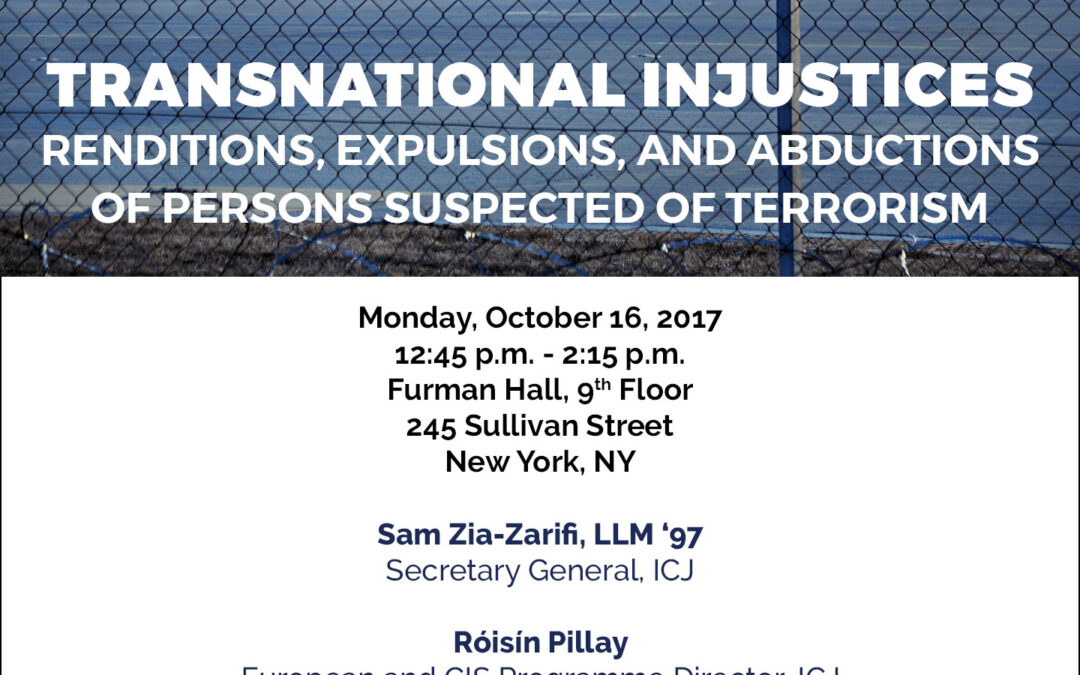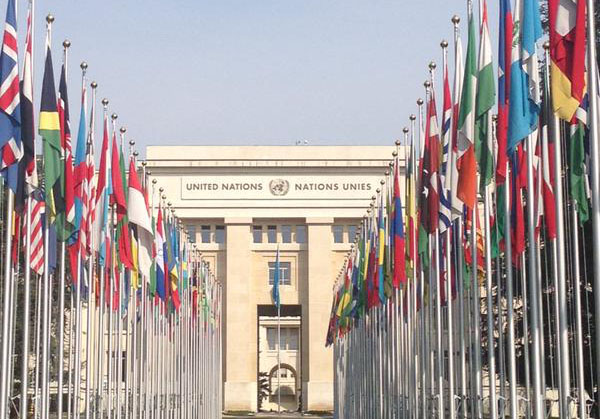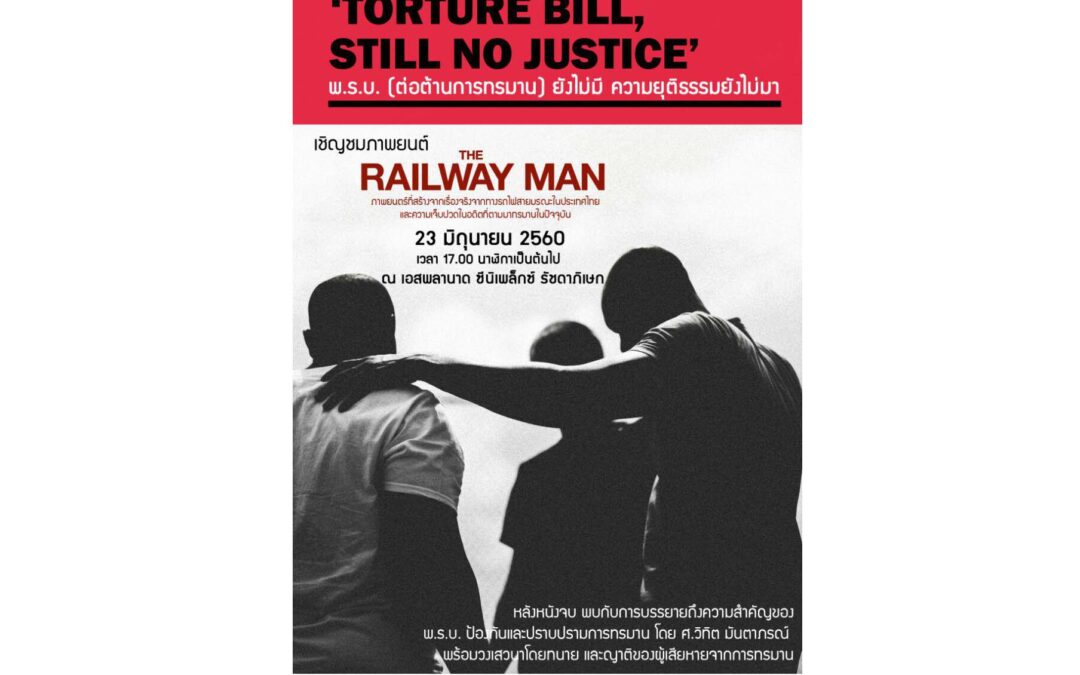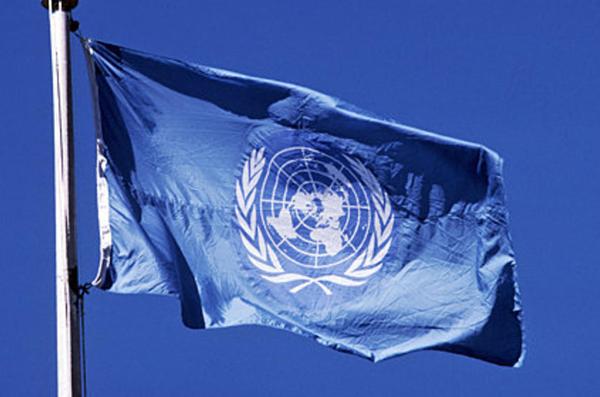
Oct 9, 2017 | Events, News
The ICJ, the Center for Human Rights and Global Justice and Amnesty International invite you today to an event to discuss challenges in prevention of, and accountability for, violations of human rights in the US-led rendition system, and in transfers of suspects in the CIS region.
Join us for a moderated discussion marking the U.S. launch of the International Commission of Jurists’ report, Transnational Injustices: National Security Transfers and International Law.
Panelists will discuss the ongoing practice of states unlawfully rendering people accused of terrorism, particularly in Russia and Central Asia, and explore the extent to which the impact of the CIA’s notorious extraordinary renditions can still be felt today.
When: Monday, October 16, 2017 – 12:45 pm to 2:15 pm
Where: Lester Pollack Colloquium Room – Furman Hall, 9th Floor, NYU School of Law – 245 Sullivan Street, New York City
RSVP here
Refreshments will be served
Speakers:
- Sam Zia-Zarifi, Secretary General, ICJ
- Róisín Pillay, European and CIS Programme Director, ICJ
- Margaret Satterthwaite, JD ’99, Professor of Clinical Law, NYU School of Law
Moderated by Julia Hall, Expert on Counter-Terrorism and Human Rights, Amnesty International
A flyer for this event is available in PDF format by clicking here.

Aug 24, 2017 | News
On the one-year anniversary of the enactment of a law establishing the Office on Missing Persons (OMP), the ICJ called on the Sri Lankan Government to swiftly operationalize the Office.
The ICJ also urged the Government to set up other transitional justice mechanisms it committed to in the context of a key 2015 UN Human Rights Council resolution, without further delay.
On 23 August 2016, the OMP Act received the Speaker’s assent and became law. Even after one year, however, the Office has not been operationalized.
Organizations have reportedly made the claim that the President has unconstitutionally allocated the subject of the OMP to himself.
The Government’s failure to follow Constitutional provisions when setting up an important office such as the OMP, which has a permanent mandate to search and trace the whereabouts of “missing persons”, leaves the office exposed to future uncertainty- a move that affected communities can ill afford after a long and unjustifiable delay in setting up the OMP, the ICJ notes.
“The delay has already resulted in affected communities losing hope and faith in the Government’s transitional justice agenda, as is evident by continuous protests in the North,” said Frederick Rawski, ICJ’s Asia and Pacific Director.
The ICJ noted that in September 2015, the Government of Sri Lanka made a promise to the people of Sri Lanka and the international community, to initiate a process of reconciliation which “involves addressing the broad areas of truth seeking, justice, reparations and non-recurrence and for non-recurrence to become truly meaningful, the necessity of reaching a political settlement that addresses the grievances of the Tamil people”.
In the context of UN Human Rights Council resolution 30/1, adopted 1 October 2015, the Government of Sri Lanka made a commitment to establish four main transitional justice mechanisms, a Commission for Truth, Justice, Reconciliation and Non-recurrence, an Office on Missing Persons, an Office for Reparations and a Judicial Mechanism with a Special Counsel, amongst numerous other reforms.
Almost two years since these promises were made, only one mechanism, the OMP, has been established by law.
In March 2017, the need for implementation of these commitments related to reconciliation, accountability and human rights were reaffirmed, and a comprehensive report, followed by a discussion on the implementation of Council resolution 30/1, is due at the Human Rights Council’s 40th session in March 2019.
The Consultation Task Force on Reconciliation Mechanisms (CTF), a panel of 11 independent eminent persons appointed by Prime Minister Ranil Wickremesinghe, publicly released its final report on 3 January 2017.
The report already outlines structures and recommendations for the promised mechanisms based on country-wide consultations.
The ICJ called on the government of Sri Lanka to implement Task Force recommendations to deliver justice for victims of human rights abuse.
“The Government of Sri Lanka should make public its plans and drafts for the proposed mechanisms based on consultations, as well as a timeline for when it hopes to establish them, in order to stop further erosion of faith by the affected communities,” Rawski added.
In February, President Sirisena affirmed that he will prioritize Constitutional Reform over Transitional Justice-related reforms adding that there is a need to foster support for Transitional Justice amongst all communities.
The linkages between the two reform processes are many and one process cannot be seen independent of the other.
There is, however, very little progress on either front or a broad-based campaign to garner support for transitional justice, the ICJ said.
Two years into its tenure, the Government of Sri Lanka must take stock of its commitments and forge ahead with its reform agenda before the increasingly negative perception of the Government compromises the change it pledged and incumbency fatigue sets in, the ICJ added.
“The Government must act, and act now, to stop the disconnect between the hopes of affected communities and the lack of substantive progress of the transitional justice agenda from growing further, and deliver on its commitments before the opportunity for progressive reform is lost for good,” Rawski added.
Contact:
Frederick Rawski, ICJ’s Asia Pacific Regional Director (Bangkok), e: frederick.rawski(a)icj.org
Thyagi Ruwanpathirana, ICJ’s National Legal Advisor (Sri Lanka), e: thyagi.ruwanpathirana(a)icj.org

Jul 27, 2017 | News
Pakistani authorities must implement the United Nations Human Rights Committee recommendations to ensure compliance with Pakistan’s human rights obligations under the International Covenant on Civil and Political Rights (ICCPR), the ICJ said today.
The Human Rights Committee, the treaty-monitoring body that oversees countries’ implementation of and compliance with the ICCPR, reviewed for the first time Pakistan’s human rights record under the Covenant on 11 and 12 July.
It issued its “Concluding Observations”, along with its recommendations, today, on 27 July.
“While it is encouraging to see Pakistan’s increased engagement with United Nations human rights mechanisms in recent years, it is deeply worrying that since ratifying the ICCPR, Pakistan’s human rights situation has worsened in a number of aspects, including with the restoration of the death penalty and the introduction of military trials for civilians,” said Livio Zilli, ICJ’s Senior Legal Adviser and UN Representative.
“It is of the utmost importance for Pakistan to reverse this trend, and make sincere efforts to implement the recommendations made by the Committee,” added Zilli.
The Committee’s recommendations include:
- Ensure the National Commission for Human Rights is able to carry out its mandate independently and effectively;
- Reinstate the moratorium on the death penalty;
- Abolish mandatory death penalty and ensure the death penalty is provided only for the “most serious crimes” involving intentional killing;
- Criminalize enforced disappearance and put an end to the practice of enforced disappearance and secret detention;
- Ensure that all allegations of enforced disappearance and extrajudicial killings are promptly and thoroughly investigated; all perpetrators are prosecuted and punished with penalties commensurate with the gravity of crimes;
- Review legislation relating to the military courts with a view to abrogating their jurisdiction over civilians as well as their authority to impose the death penalty;
- Reform the proceedings of military courts and bring them into full conformity with Articles 14 and 15 of the Covenant to ensure a fair trial;
- Ensure that all elements of the crime of torture are prohibited in accordance with article 7 of the Covenant;
- Repeal all blasphemy laws or amend them in compliance with the strict requirements of the Covenant; and
- Review policies and legislation on registration of international NGOs, including the vague grounds on which registrations can be cancelled.
This is the first time Pakistan’s human rights record is being reviewed by the Human Rights Committee since Pakistan ratified the Covenant in 2010.
Contact:
Livio Zilli, ICJ Senior Legal Advisor and UN Representative (Geneva), e: livio.zilli(a)icj.org
Reema Omer, ICJ International Legal Adviser for Pakistan (Lahore), t: +923214968434; e: reema.omer(a)icj.org
Background:
Pakistan ratified the International Covenant on Civil and Political Rights (ICCPR) in June 2010.
Following ratification/accession, every state party to the ICCPR is required to submit an initial “state report” containing information on the implementation of each provision of the treaty.
Pakistan submitted its initial state report to the Human Rights Committee in October 2015.
In light of the information provided in the State report, as well as information received from civil society, the Human Rights Committee then prepared a List of Issues containing particular issues of concern to the Committee, and asking whatever questions it sees fit in light of those concerns.
The answers provided by the State party to these questions, as well as other information submitted by civil society and others formed the basis of the “review” of the State’s compliance with the treaty, which was carried out on 11 and 12 July by the Human Rights Committee.
During the review, the Committee met with Pakistan’s delegation, headed by Federal Minister for Human Rights, Senator Kamran Michael, who presented answers to the List of Issues and responded to the Committee’s questions.
The Committee’s Concluding Observations issued today are highly authoritative, and highlight the Committee’s concerns and make recommendations to the State on improving the implementation of the ICCPR.
The ICJ made submissions to the Human Rights Committee in relation to the formulation of List of Issues in 2016 and the Review in 2017.
In its submissions, the ICJ raised concern about the inadequate legal framework on torture and other ill-treatment; the continuing practice and impunity for enforced disappearances; the incompatibility of military trials of civilians with the right to a fair trial; the incompatibility of Pakistan’s blasphemy laws with the rights to freedom of religion and belief, expression and fair trial; and the vaguely defined INGO policy.
The Human Rights Committee picked up ICJ’s concerns as its principle matters of concern and recommendations in its Concluding Observations.

Jun 23, 2017 | News
Today, the ICJ co-hosted an event in Bangkok, Thailand, named “Torture Bill, Still No Justice” to commemorate International Day in Support of Victims of Torture.
The event began with a keynote address by Professor Vitit Muntarbhorn, Special Rapporteur on violence and discrimination based on sexual orientation and gender identity and former ICJ Commissioner.
Following a screening of the film “The Railway Man”, the ICJ moderated a panel discussion which included victims of torture.
The event focused on the decision in February this year of Thailand’s National Legislative Assembly (NLA) to further delay the passage of essential legislation criminalizing torture and enforced disappearance.
Thailand is a State party to the International Covenant on Civil and Political Rights (ICCPR), the Convention against Torture and other Cruel, Inhuman or Degrading Treatment or Punishment (CAT), and has signed, but not yet ratified, the International Convention for the Protection of All Persons from Enforced Disappearance (ICPPED).
The other organizers of the event were the Southeast Asia Regional Office of the Office of the High Commissioner for Human Rights, Amnesty International Thailand, the Cross-Cultural Foundation (CrCF), the Association for the Prevention of Torture (APT) and the Canadian Embassy in Bangkok.
A comic in English and Thai named “Torture is a Crime” was produced especially for the event by Shazeera Zawawi of APT.
Contact
Kingsley Abbott, ICJ Senior International Legal Adviser for Southeast Asia, t: +66 94 470 1345 ; e: kingsley.abbott(a)icj.org
Thailand-Comic-Torture is A Crime-Advocacy-2017-ENG (English version of the comic, PDF)
Thai version here

Jun 5, 2017 | Advocacy, Non-legal submissions
The ICJ has made a submission to the UN Human Rights Committee in advance of its forthcoming examination of Pakistan’s initial report under International Covenant on Civil and Political Rights (ICCPR).
In its submission, the ICJ has brought to the Committee’s attention concerns in relation to the following issues:
- The compliance of Pakistan’s counter-terrorism laws with the State’s obligations under Articles 6, 9 and 14 of the Covenant, particularly in the context of its “military justice” system;
- Shortcomings in the legal framework relevant to torture and other ill-treatment;
- The continuing practice of enforced disappearances and, in this context, the ongoing impunity of law enforcement and military agencies;
- The compliance of Pakistan’s blasphemy laws with Articles 14, 18, and 19 of the Covenant; and
- The compatibility of Pakistan’s “International Non-Governmental Organizations Policy” with the State’s obligations under Article 22 of the Covenant.
The Human Rights Committee will examine Pakistan’s initial report during its 120th session, which will be held in Geneva from 3-28 July 2017.
Following the review, the Committee will adopt Concluding Observations setting out recommendations to the Pakistani Government.
Pakistan -ICCPR submission-Advocacy-non legal submission-2017-ENG (full text in PDF)









